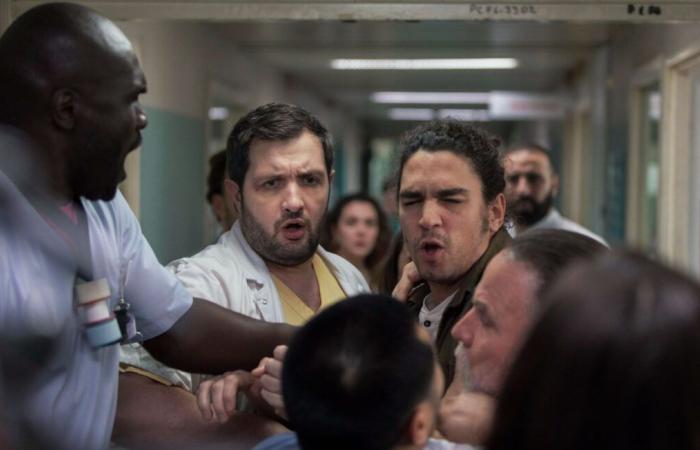After more than three years of waiting, season 3 of the medical series Hippocrates will make its big comeback this Monday on Canal+! Season 2 was partly written and filmed in the middle of a pandemic. Confinement had arrived, and Thomas Lilti, the creator of the series, had put on his doctor's coat for a few weeks, his initial training before becoming a screenwriter and director.
Remember: in the last minutes of season 2, we left the team of caregivers at Raymond-Poincaré Hospital at the start of the health crisis, the day after the announcement of the first confinement by the President of the Republic. At the start of this season 3, we find Chloé (Louise Bourgoin), Arben (Karim Leklou), Alyson (Alice Belaïdi), Hugo (Zacharie Chasseriaud) and Olivier Brun (Bouli Lanners) in the aftermath of the pandemic. Why did Thomas Lilti decide to sidestep the Covid-19 health crisis? Explanations.
“I knew it was going to take me a little time to write this new season. When I started writing season 3, the health crisis wasn't quite behind us, but I had a feeling that when it came out, it would be. Hippocrates has always had this pretension of trying to tell what will happen, of anticipating things a little rather than looking in the rearview mirror,” explains Thomas Lilti to 20 Minutes.
“Great difficulties in accessing care”
This season 3 therefore begins in the summer, the day after the Covid-19 pandemic. By decision of health authorities, many hospital services have been closed and those that remain open are overloaded. “In the summer, with all these beds closing and these services going into half-speed mode, this creates great difficulties in accessing care. And the first populations to toast are, as always, the disadvantaged populations,” comments Thomas Lilti.
Intervening for SOS Médecins, Alyson finds herself in the apartment of a mafia gang from the East where tension is rising. A man is between life and death, after having waited in vain for the arrival of paramedics. As she struggles to save her patient, she is physically abused by those close to her. Following his attack, SOS doctor went on strike, accentuating the difficulty of access to care for the population.
Last place to go for treatment? The emergency department where Chloé, Arben and Brun try to cope. Patients are flocking and tensions are palpable. “Societal violence appears in Hippocrates. In the first episode around Alysson and episode 2 where a fight breaks out in the corridors because the director announces that the emergency room is closed. These are angers of frustration,” comments the creator of the series.
“Caregivers are tired”
This new season does not tackle the health crisis head-on, but examines the consequences of Covid-19 on the French hospital system. “Season 2 told the story of the state of the hospital just before the crisis. I found it more interesting to wonder what this hospital looks like today? What state are caregivers and patients in once the crisis is over? », defends the creator of Hippocrates.
“We experienced a tragedy… The caregivers are tired because we are tired. You are tired, I am tired,” says Olivier Brun, the head of emergencies (Bouli Lanners, always impeccable) to his teams. “Finally, in this season 3, Covid is omnipresent, but off-camera, with the traces it has left on the psychology of caregivers, on their terror of having to provide care in these conditions and the fear that it will come back” , comments the creator ofHippocrates.
“The pandemic has left its mark”
Covid has indeed left a field of ruins: “Even though we applauded and supported caregivers during this crisis, we realize that the pandemic has left its mark,” believes Thomas Lilti.
At Poincaré hospital, caregivers quickly realize that the instructions are untenable and some decide to disobey. “What happens when the institution, the system, the laws that govern us, give us the feeling of preventing us from doing things well? Should we go into resistance? Disobey? Becoming an outlaw at the risk of putting yourself in danger? This is the dilemma our heroes face,” explains Thomas Lilti.
“The health system is our common heritage”
Thus, if the creator has avoided the health crisis, it is to better tell the story of its deleterious consequences on our health system. “The health system is our common heritage. We hold on to it fiercely, and to see it deteriorate, to see those who work there suffer, we cannot look at this with a light eye”, concludes Thomas Lilti who has the desire to “continue to tell the story of this health system which never stops to evolve.”






